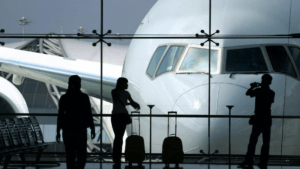 Just when you thought it safe to let your mask down, another travel threat climbs on our backs. With a name like Monkeypox, it’s tailor made to alarm.
Just when you thought it safe to let your mask down, another travel threat climbs on our backs. With a name like Monkeypox, it’s tailor made to alarm.
The Public Health Agency of Canada is warning travellers to be careful of catching monkeypox while on vacation, reports the CBC , and issued a “Level 2 - Practise enhanced health precautions" travel notice on 07JUN.
The Agency notes travellers could find themselves quarantined in certain countries to prevent the spread of the virus, may have limited access to health care should they become ill and may be delayed in returning home.
The Level 2 notice recommends travelllers consult a health care professional or visit a travel health clinic at least 6 weeks before they travel and says to be "particularly vigilant" planning to attend a large party or mass gathering while on their trip.
Warnings Gone Ignored
African scientists who have tracked the virus for years say that warnings surrounding monkeypox "went ignored," reports the CBC.
"The recent outbreaks are kind of the culmination of years of warnings that basically went ignored," said Dr. Boghuma Titanji, a scientist and infectious diseases physician at Emory University in Atlanta who is originally from Cameroon.
More than 2,800 suspected cases were reported in 2018 in the Democratic Republic of the Congo alone. In 2019, that number jumped to 3,800. By 2020, the total number of annual suspected cases in Africa reached nearly 6,300, including 229 deaths.
Why Now?
Hundreds of cases have been reported so far across multiple continents, reports the CBC, with more than 100 confirmed or suspected infections now under investigation in Canada.
Dr. David Heymann, an adviser to the World Health Organization and former head of its emergencies department, recently suggested that the global outbreak was a "random event" and likely tied to transmission at raves held in Europe.
According to the CBC, those infected with monkeypox can be contagious for close to one month, suggesting that high case counts in Africa and a surge in global travel may be creating "ideal conditions" for the virus to spread.
However, the virus is different compared to COVID-19, said Dr. Oyewale Tomori, a Nigerian virologist. "We don't see rapid transmission like you see with COVID, for example," he explained.
Even still, Dr. Hans Henri P. Kluge, the WHO's regional director for Europe, issued a statement on his concern that the "potential for further transmission in Europe and elsewhere over the summer is high," due to the number of festivals and other mass gatherings planned.





